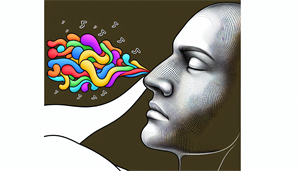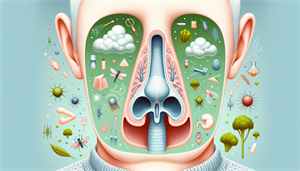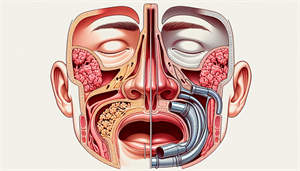Struggling with nasal congestion and snoring can disrupt your sleep and that of your loved ones. This concise guide explores why congestion leads to snoring and provides you with actionable solutions. Gain insight into the causes and learn effective strategies for a peaceful night’s sleep.
Key Takeaways
-
Nasal congestion can cause snoring by increasing airway resistance and creating suction in the throat, which potentially collapses the airway; addressing congestion can improve sleep quality.
-
Factors contributing to nasal congestion and snoring include physical abnormalities like deviated septum, lifestyle choices like alcohol and smoking, allergies, and sinus infections.
-
Effective remedies for congestion-induced snoring range from over-the-counter medications and nasal strips to lifestyle changes; severe cases may require medical interventions like surgery.
The Connection Between Nasal Congestion and Snoring

Snoring and nasal congestion are often two sides of the same coin. Nasal congestion can impede normal breathing and create increased suction forces in the throat, potentially leading to the collapse of the throat and resulting in snoring. Ever wondered why a blocked nose often leads to louder snoring? It’s due to the increased resistance and suction in the airway caused by the blocked nose.
Even a stuffy nose resulting from sinus problems or a misshapen sinus cavity can exacerbate snoring by impeding the airflow and compromising nasal breathing, which is when snoring occurs.
Comprehending the link between nasal congestion and snoring paves the way for effective solutions. Tackling the root cause, nasal congestion, can notably diminish snoring and enhance sleep quality.
How Nasal Congestion Affects Breathing at Night
As we snooze, our breathing tends to become more shallow, increasing the resistance in the upper airway. Thus, the nasal component of the respiratory system becomes pivotal in controlling breathing. However, a congested or obstructed nasal passage can impede this nighttime breathing, exacerbating snoring, especially if it’s caused by a sinus infection.
Moreover, sinus congestion frequently results in mouth breathing, which subsequently relaxes the throat muscles and constricts the airway, culminating in snoring. This can also restrict airflow through the nasal passages, contributing to sleep apnea and making it difficult to get adequate sleep.
The Role of Nasal Passages in Sleep Disordered Breathing
The nasal passages serve to enable both inhalation and exhalation, while concurrently filtering and conditioning the air to safeguard the lower airways. A stuffy nose, however, can impede this process and lead to snoring.
Additionally, the structure of the nasal passages can influence snoring during sleep by instigating nasal obstruction and increasing upper airway resistance. This could potentially result in a partial airway obstruction that hinders nasal breathing. Nasal congestion can thus result in sleep-disordered breathing, encompassing conditions such as apnea, hypopnea, and snoring.
Common Causes of Nasal Congestion and Snoring

Several factors contribute to nasal congestion and snoring. These encompass physical abnormalities such as nose inflammation, damaged nasal folds, nasal polyps, and a deviated septum.
Moreover, lifestyle elements significantly influence the occurrence of nasal congestion and snoring. Prevalent factors include allergies, sinus infections, and lifestyle factors such as alcohol consumption and smoking. Addressing these common causes can be a significant step towards reducing nasal congestion and snoring.
Allergies and Sinus Infections
Allergies can significantly contribute to nasal congestion and snoring. Allergies that result in nasal congestion, characterized by symptoms like sneezing and a runny nose, can exacerbate snoring-related issues. The presence of dust in the bedroom, for instance, can induce allergic responses that obstruct the nasal passages and contribute to snoring.
The type of allergy most prone to causing nasal congestion that leads to snoring is allergic rhinitis. Using allergy medication can help alleviate the symptoms and reduce snoring. Similarly, sinus infections can result in nasal congestion and snoring due to the inflammation and obstructions they cause within the nasal passages.
Deviated Septum and Nasal Polyps
A deviated septum is distinguished by the off-center or asymmetric positioning of the cartilage that partitions the nasal cavities, leading to one cavity being more prominent than the other. This condition can lead to nasal blockage and snoring, as it hinders the normal airflow through the nose.
A deviated septum can arise from nasal injury or trauma, such as a nasal fracture. Some individuals may have a congenital deviation of the septum. This deviation can disrupt natural sleep by causing irregularities in breathing and making it hard to establish a healthy breathing rhythm during sleep, often resulting in restlessness and poor sleep quality.
Lifestyle Factors
Lifestyle elements like alcohol consumption and smoking can notably influence nasal congestion and snoring. Alcohol consumption causes relaxation of throat muscles, potentially leading to airway obstruction and exacerbating snoring. It also contributes to nasal congestion. Exposure to smoke and other irritants can also result in nasal congestion.
Obesity, mainly due to the potential for airway obstruction, is another factor that can escalate the probability of nasal congestion and snoring. Dietary choices, such as dairy products and red meat, can also increase mucus production and cause inflammation in the airways, leading to congestion and snoring. Transitioning to an anti-inflammatory diet may assist in addressing these issues.
Effective Remedies for Nasal Congestion-Related Snoring

Numerous effective remedies exist for nasal congestion-related snoring, varying from over-the-counter medications to lifestyle modifications. Some options include:
-
Over-the-counter medications like steroid nasal sprays such as Budesonide (Rhinocort), Fluticasone (Flonase), or Triamcinolone (Nasacort)
-
Nasal strips or dilators
-
Saline nasal rinses
-
Sleeping with an elevated head
-
Avoiding allergens and irritants
These remedies can help address snoring caused by nasal congestion.
In addition, nasal strips and dilators can reduce snoring by widening the nostrils or nasal passages, thereby enhancing airflow and reducing nasal congestion.
Lifestyle modifications that can greatly aid in alleviating both nasal congestion and snoring include:
-
Adjusting sleep position
-
Engaging in weight management
-
Refraining from alcohol consumption
-
Adhering to proper sleep hygiene
Over-the-Counter Medications
Over-the-counter medications such as Sudafed, which contains pseudoephedrine, are renowned for their effectiveness in curbing nasal congestion and relieving snoring. Pseudoephedrine functions as a decongestant and aids in alleviating nasal congestion.
When used in combination with a nasal decongestant, Pseudoephedrine has demonstrated effectiveness in reducing or eliminating severe snoring in numerous subjects. It’s important to note that these medications should be used as directed and under the supervision of a healthcare professional.
Nasal Strips and Dilators

Nasal strips and dilators serve as potent tools in combating nasal congestion and snoring. They work by:
-
Expanding the nostrils
-
Enhancing airflow
-
Decreasing snoring
-
Improving breathing
Brands such as Breathe Right Nasal Strips and Rhinomed Mute Anti-Snoring Nasal Dilator are often recommended for those struggling with snoring caused by nasal congestion. It’s important to note that while these tools can be highly effective, they may cause skin irritation in some individuals due to the adhesive.
Natural Remedies and Lifestyle Changes
Natural remedies along with lifestyle alterations can prove highly effective in mitigating nasal congestion and snoring. For instance, sleeping on your side, maintaining good sleep habits, and changing your diet can help open up nasal passages and facilitate easier breathing during sleep.
In particular, an anti-inflammatory diet can help alleviate sinus congestion, and being mindful of specific food choices can mitigate snoring. Other potential natural remedies to consider include using peppermint oil, goldenseal, and practicing nasal irrigation with a neti pot.
Combining Remedies with a Mouthpiece
Pairing remedies with a mouthpiece can offer supplementary relief from snoring induced by nasal congestion. A snoring mouthpiece is designed to address snoring by repositioning the lower jaw forward to maintain an unobstructed air passage while sleeping.
It is possible to use over-the-counter snoring mouthguards alongside a snoring mouthpiece, although their efficacy may differ, and it’s crucial to seek personalized advice from a healthcare professional.
While some individuals utilize oral snoring strips in conjunction with nasal dilators, nasal sprays, or nasal strips, these are generally regarded as a temporary solution and may not adequately target the underlying causes of snoring.
When to Consult a Doctor

If you suffer from severe snoring or encounter symptoms of sleep apnea, it’s advisable to consult a doctor. Severe snoring that results in sleep disturbances, daytime fatigue, or any potential symptoms of sleep apnea should lead you to seek medical attention.
It’s also crucial for children to undergo an evaluation, as snoring can lead to sleep apnea, necessitating a thorough diagnosis and an appropriate treatment plan.
Symptoms of Sleep Apnea
Symptoms of sleep apnea could signal a more grave issue, such as a sleep disorder. Persistent snoring can indeed act as a possible indicator of obstructive sleep apnea.
Diagnosing sleep apnea involves a comprehensive evaluation of symptoms and a detailed sleep history, in addition to the administration of tests such as polysomnography. If you experience persistent, loud snoring, especially accompanied by daytime sleepiness, it’s time to consult a healthcare professional.
Treatment Options for Severe Cases
For intense cases of nasal congestion and snoring, possible treatments may involve surgical procedures or other medical interventions. Available treatments encompass surgical procedures, such as the removal of blockages in the nasal passage or the correction of structural issues within the nasal cavity.
Balloon sinuplasty is a minimally invasive procedure that involves the dilation of sinus passageways using a small balloon. It’s been shown to effectively alleviate snoring and enhance sinus airflow.
LATERA implants are another option, designed to provide support to nasal cartilage, thereby diminishing nasal airway obstruction and enhancing airflow through the nasal passages.
Summary
In conclusion, nasal congestion and snoring are interconnected issues that can significantly impact your sleep quality. However, there are several effective solutions, from over-the-counter medications to lifestyle changes, which can help reduce these problems. If you’re struggling with severe snoring or symptoms of sleep apnea, don’t hesitate to seek medical advice. Remember, a good night’s sleep isn’t just a dream - it’s well within your reach!
Frequently Asked Questions
How do I stop nasal congestion and snoring?
To reduce nasal congestion and snoring, try taking a hot shower before bed, rinsing your nasal passages with a salt-water solution, using a neti pot as recommended by your doctor, and using nasal strips to keep the airways open while you sleep.
Do people snore when they are congested?
Yes, people can snore when they are congested due to the obstruction of the airway. It is important to treat the root issue to reduce snoring frequency.
Will a decongestant help with snoring?
Yes, a decongestant can help with snoring by treating congestion and improving breathing during sleep.
Do you snore more when your nose is blocked?
Yes, snoring can increase when your nose is blocked, as it forces you to breathe through your mouth, leading to an increased likelihood of snoring. The best way to address this is by treating the underlying nasal issue.
Could allergies be causing my snoring?
Yes, allergies can worsen snoring by leading to nasal congestion.

